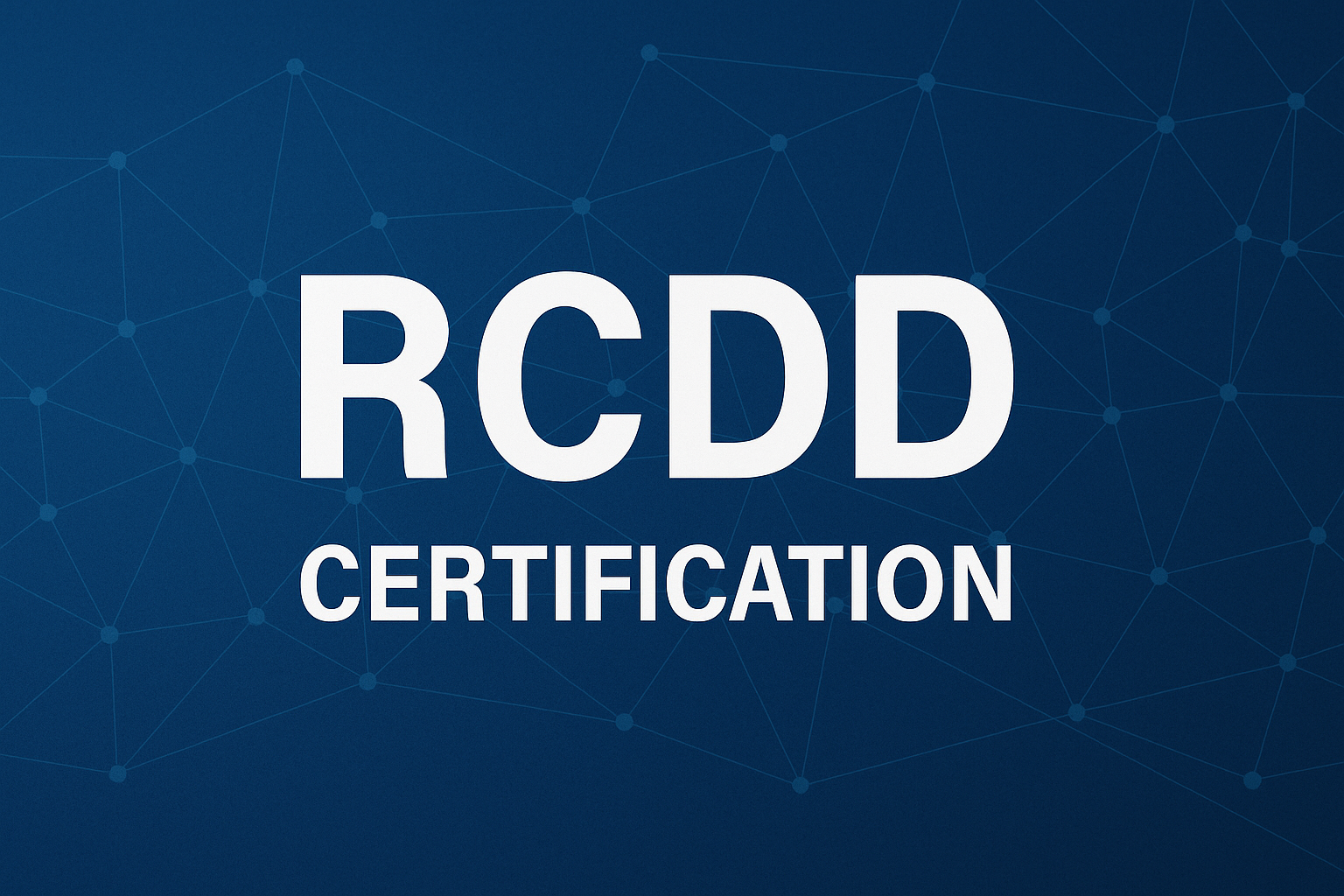The RCDD Certification (Registered Communications Distribution Designer) is a prestigious credential awarded by BICSI, an internationally recognized professional association supporting the advancement of the information and communications technology (ICT) industry. Earning this certification proves your ability to design, integrate, and implement structured cabling systems and infrastructure for data, voice, security, and video solutions.
This certification is essential for professionals involved in the planning and design of telecom systems, especially in commercial buildings, data centers, and large-scale infrastructure.
Why is RCDD Certification Important?
In today’s fast-evolving digital landscape, businesses require reliable and scalable network infrastructure. RCDD-certified professionals are the experts who ensure that such systems are designed efficiently and according to the latest codes and standards.
Key Benefits:
-
Industry validation: Demonstrates expert knowledge in ICT systems.
-
Professional credibility: Adds weight to your resume and project proposals.
-
Career growth: Opens doors to leadership roles in ICT and construction projects.
-
Global opportunities: Recognized in more than 100 countries.
Who Should Pursue RCDD Certification?
This certification is ideal for a variety of professionals, including:
-
ICT and network infrastructure designers
-
Telecom engineers and consultants
-
Data center design experts
-
Project managers in construction and ICT
-
Low-voltage and structured cabling professionals
Whether you’re an experienced designer or transitioning into a new role, the RCDD Certification can significantly boost your credibility and income potential.
Eligibility Criteria for RCDD Certification
To apply for the RCDD exam, BICSI requires candidates to meet specific professional experience standards:
You must have either:
-
5 years of verified ICT design experience
OR -
2 years of ICT design experience plus:
-
3 additional years of ICT industry experience
-
OR a degree (2-year or higher) in ICT, telecommunications, or a related field
-
Applicants must submit a detailed application with documentation of their experience.
Exam Details: What to Expect
The RCDD Certification exam is challenging and designed to thoroughly test your knowledge of ICT systems and design principles.
Exam Highlights:
-
Format: 100 multiple-choice questions
-
Duration: 2.5 hours
-
Delivery: Online or at a Pearson VUE testing center
-
Core Topics:
-
Telecommunications pathways and spaces
-
Cabling systems: copper, fiber, coax
-
Grounding and bonding
-
Network design principles
-
Data center infrastructure
-
Outside plant design
-
Project specifications and documentation
-
How to Prepare for the RCDD Certification Exam
The path to becoming RCDD-certified requires focused preparation and access to the right resources.
1. Study the TDMM
The Telecommunications Distribution Methods Manual (TDMM) is the foundation of the exam. Thoroughly studying this manual is essential to passing.
2. Enroll in an RCDD Prep Course
Many training providers offer online and classroom-based RCDD prep courses that cover core topics, include practice exams, and help you master complex design scenarios.
3. Take Practice Tests
Mock exams help simulate the real exam environment, build confidence, and reveal areas where you need to improve.
4. Join ICT Communities
Networking with others pursuing or holding the RCDD credential can provide guidance, study tips, and moral support.
RCDD Certification Cost Breakdown
Here are the approximate costs associated with earning your RCDD credential:
| Item | Cost (USD) |
|---|---|
| Application Fee (Member) | $535 |
| Application Fee (Non-Member) | $640 |
| Retake Fee | $135 |
| TDMM Manual | $300–$400 |
| RCDD Training Course (optional) | $1,500–$3,500 |
While this may seem like a significant investment, the long-term career benefits far outweigh the upfront costs.
Maintaining Your RCDD Certification
Once earned, the RCDD credential is valid for 3 years. To maintain your certification, you must:
-
Earn 45 Continuing Education Credits (CECs)
-
Submit a renewal application
-
Pay the renewal fee
-
Adhere to BICSI’s Code of Ethics and Professional Obligations
You can earn CECs through training programs, webinars, or by contributing to industry publications and events.
Career Opportunities After RCDD Certification
Earning your RCDD credential opens up a range of lucrative job opportunities. Roles include:
-
ICT Design Engineer
-
Structured Cabling Consultant
-
Project Manager – ICT Infrastructure
-
Telecommunications Network Designer
-
Data Center Planner
-
Security Systems Designer
Average Salary:
-
Entry-Level RCDD: $70,000 – $85,000/year
-
Experienced RCDD: $90,000 – $110,000/year
-
Senior-Level/Consultant: $120,000+/year
These salaries vary based on location, experience, and company size, but the RCDD Certification often leads to higher pay and more senior positions.
RCDD vs Other Certifications
How does RCDD compare to other industry certifications?
| Certification | Focus | Ideal For |
|---|---|---|
| RCDD | ICT system design | Designers & Engineers |
| PMP | Project management | ICT Project Managers |
| DCDC (BICSI) | Data center design | Data Center Professionals |
| CCNA/CCNP | Networking & configuration | Network Administrators |
While technical certifications like CCNA cover configuration, RCDD Certification focuses on the physical and design aspects of ICT systems, making it a perfect complement.
Final Thoughts: Is RCDD Certification Worth It?
Absolutely. The RCDD Certification is a powerful career booster for ICT and telecom professionals. With high industry demand, strong salary potential, and global recognition, it’s one of the most valuable credentials you can earn in this field.
Whether you’re aiming to design enterprise-level networks, lead infrastructure projects, or consult on smart buildings, RCDD Certification will put you ahead of the competition.

Leave a Reply